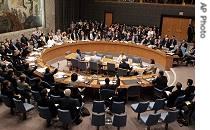2006年VOA标准英语-UN Security Council Sets Vote On Iran Sanctions(在线收听)
By Peter Heinlein
United Nations
20 December 2006
The U.N. Security Council is set to adopt a resolution penalizing Iran for its suspect nuclear program. But as VOA's correspondent at the U.N. Peter Heinlein reports, the penalties have been weakened to meet Russia's objections.
 |
| U.N. Security Council |
But the text given to the Security Council Wednesday is weaker than what the United States and its European sponsors had originally proposed. Earlier drafts included tough sanctions, including a travel ban on Iranian officials involved in suspect nuclear activities.
Some sanctions remain, including a ban on imports and exports of materials and technology relating to uranium enrichment or reprocessing, as well as to ballistic missile delivery systems. The measure would also freeze the assets of 12 people and 11 agencies listed in an annex the to resolution.
In response to Russian objections, however, the travel ban has been reduced to a voluntary monitoring system. Under its terms, states would be called on to exercise vigilance in allowing entry to anyone named on the list. Those states would be required to report such visits to the Security Council.
The United States had pushed for stronger penalties, and acting U.S. Ambassador Alejandro Wolff was clearly disappointed in the latest draft. After meeting with the sponsors Wednesday, Wolff told reporters it was "too early to tell" whether Washington could support the weakened language.
"We have to look at the balance of what this text looks like, what it does accomplish, things that we wanted that aren't the way we wanted them. There are things we wanted that are still in there, that are very, very important, so we'll have to assess the balance of the resolution and decide accordingly," he said.
Russia had strongly opposed the travel ban, and had held up approval of the resolution for months. Moscow's U.N. Ambassador Vitaly Churkin signaled Wednesday that the new draft is acceptable to Russia.
"This is a carefully targeted resolution which would create certain problems for Iran in pursuing the activity which the Security Council, the international community does not want them to pursue," he said.
The draft resolution is a response to Iran's failure to comply with an earlier Council resolution that set an August 31st deadline for Tehran to suspend uranium enrichment and return to negotiations.
But Iran's President Mahmoud Ahmedinejad has said his country's nuclear program is for peaceful purposes, and has refused to halt enrichment. He has said his government will not be intimidated by the threat of sanctions.